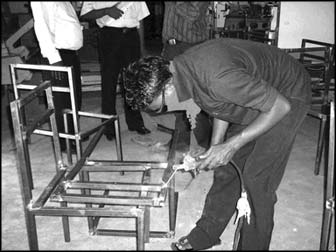|
Economic policy shifts in post independent Sri Lanka
- Part III:
1970-1977: Regulated economic policies
SAJITH DE MEL
A coalition of SLFP and left-wing parties known as United Front
formed a new Government in the general elections of 1970. This regime
saw a complete reversal of the liberal economic policy stances initiated
by the previous Government. The State was to play a major role in the
rejuvenating the deteriorating economic circumstances.
 |
|
Boost local
industrial sector |
The State assuming the role of a producer in the economy, a radical
import substitution industrial policy was implemented. Under the
Business Acquisition Bill, several industrial undertakings were taken
over, while under the State Industrial Corporation Act, new industrial
corporations were established.
The role of the State in the economy saw an expansion, while
discouraging and crowding out the private sector investments.
The size of the public sector increased from ten per cent in 1950 to
30 per cent in 1977 and the number of State enterprises increased from a
handful in 1960 to more than one hundred by 1970. A five year plan
(1972-1976) was introduced by the Government that was to guide the
development policy of the country.
However the aspects such as the food subsidy, administered pricing
policies by the State corporations and the worsening external payment
situation, crippled the Government in mobilising resources in the
economy as per the plan.
High levels of tariffs and quantitative restrictions over imports,
quantitative controls over foreign exchange payments, individual
licensing system and monopoly by the Government over the importation of
essential commodities were the order of the day.
Along with the policy of nationalisation of the industries, the
Government also exhibited an interest in attracting foreign investments.
A White paper issued in 1972, reiterated the Government’s interest in
foreign capital. However, attraction by the part of the foreign
investors was dismal due to contradictory economic policies. One of the
major reasons that led to the defeat of the previous regime was the cut
in the rice subsidy.
This came under the attack of the SLFP led coalition in facing the
elections. With the coming into power, one of the first steps undertaken
by the Government was to respect its promises and to thereby to reinstal
the rice subsidy.
With the cut in the rice subsidy and the installation of the
administrative controls, the UNP led regime was capable of improving the
rice cultivation up to two thirds of the country’s requirements.
However the massive welfare economics practised by the regime of the
1970’s, almost paralysed the rice cultivation in the island.
Confronted by the same combination of factors that led to the defeat
of the previous regime; grave unemployment, rising prices and scarcities
in essential consumption items, the United Front Government faced a
deadly threat from the JVP, an ultra left organisation dominated by the
educated unemployed youth in 1971.
The rebels although defeated played a significant part in shaping the
future economy of Sri Lanka. Sri Lanka was pushed more rapidly towards
being a socialist society.
The liberalisation of the local economy initiated by the UNP regime
being completely abandoned, the State established control and dominance
over the economy.
The Land Reforms Law of 1972 and the nationalisation of the
plantations in 1975, State control in trade and industry were some
momentous measures taken.
One may confess a strong correlation between the UF Government’s
foreign policy and the economic policy. On the ideological front it was
anti-capitalist, anti western.
The external economic policy aims expressed by the UF regime were to
enable the Government to rely on more trade than aid, avoid making
extensive borrowings from international lending institutions, putting
forward Sri Lanka’s own conditions in external borrowing that ensures
Sri Lanka’s self respect, independence and sovereignty.
Such a policy would nevertheless confess a commitment to liberate the
economy from Western economic domination. Naturally the response of the
West to the economic approach of the UF Government was negative, and
thus this was experienced by way of sharp decline in trade and aid.
To be continued
|





